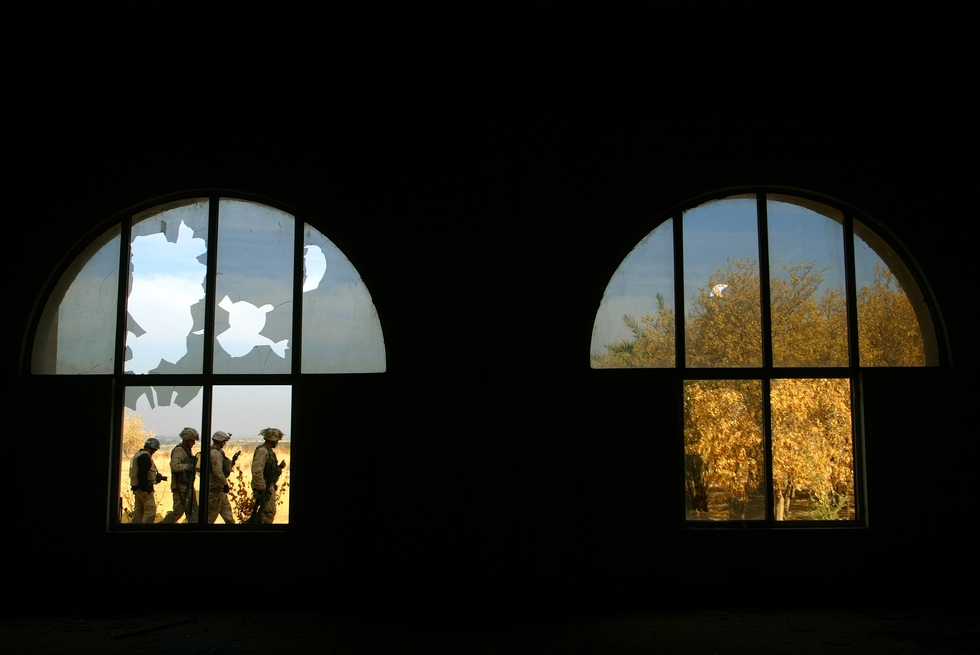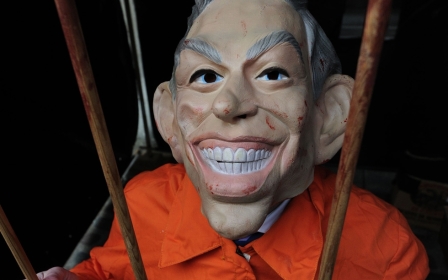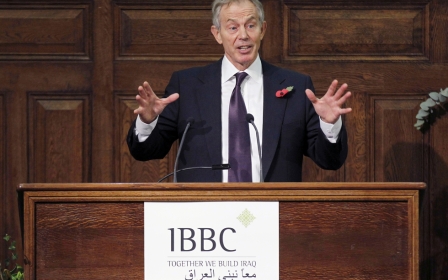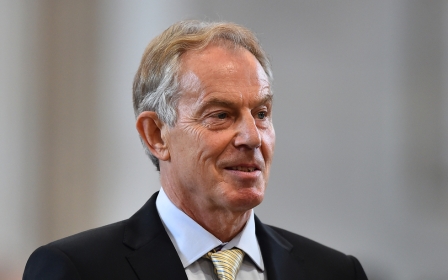
How Tony Blair lied to Parliament to fulfil his war promise to Bush
Let’s try a mental experiment. Let’s assume that the United States, supported by the United Kingdom, had not invaded Iraq.
What would have happened? Granted, there can never be a definitive answer – but it’s hard to imagine that the world would be in a worse state than it is now.
Would Iraq have collapsed as a state? Would terrorists even more barbaric than al-Qaeda now occupy large territories and victimise their populations? Would thousands of Iraqis have died needlessly and prematurely?
Would the Middle East now be in flames leaving untold numbers of its people seeking refuge from it in Europe?
The truth is that Tony Blair helped to promote the greatest calamity of the 21st century so far. There is no doubt in my mind that he lied to the British people – and there’s even a case for considering him a war criminal.
I have come to this conclusion only after forensically examining the enormous mass of evidence given to the Iraq Inquiry, led by Sir John Chilcot, which began seven years ago.
His report, which will be published on July 6, is likely to stretch to around 2 million words – nearly four times the length of War and Peace. Essentially, however, it will boil down to a few crucial issues…
BLAIR’S SECRET COMMITMENT
In January 2002, President George W Bush startled most of his allies when he named Iraq, Iran and North Korea as "an axis of evil, arming to threaten the peace of the world".
Iraq, he claimed, had been plotting for more than a decade to develop anthrax, nerve gas and nuclear weapons. As a supporter of "terror", it might well provide these to terrorists.
In fact, there was no evidence to support this last claim: not only was Saddam Hussein ideologically opposed to al-Qaeda, but he wouldn’t allow it to operate in his territory.
Regardless, the United States now set about seeking allies for an attack on Iraq. Thus, Bush invited Blair and his family to visit him at his family ranch in Crawford, Texas that April – nearly a full year before the invasion.
Most unusually, there were no advisers present and no notes were taken. So what was discussed?
Bush explained that the United States was committed to regime change: it wanted to get rid of Saddam on the grounds that the world would be better off without him. There was one big problem with this objective, however.
Under international law, regime change can never be grounds for the invasion of another country. Not that this mattered to Bush and his circle - as far as they were concerned, international law was a joke.
Tony Blair expressed strong support for regime change, but told Bush he’d need to find cover under international law by seeking support from the United Nations. Well-placed observers believe that he also made a private pledge to commit Britain to war.
Documents later presented to Chilcot’s inquiry set out very clearly the background to their dialogue.
On 12 March 2002, just weeks before the Crawford summit, Blair’s chief foreign policy adviser David Manning had a conversation with Condoleezza Rice, Bush’s national security adviser. The prime minister, Manning told her, ‘would not budge in [his] support for regime change’.
Five days later, Christopher Meyer, the UK’s ambassador in Washington, met US Deputy Secretary of Defense Paul Wolfowitz. Meyer told him that Britain "backed regime change, but the plan had to be clever and failure was not an option".
On 25 March, the Foreign Secretary Jack Straw sent the Prime Minister a shrewd memo just before the meeting with Bush.
To provide legal cover and a plausible pretext for war, he said, Blair needed to present the elimination of Iraq’s weapons of mass destruction [WMD] capacity as his objective, rather than regime change. The first step would be to send weapons inspectors to Iraq.
But could inspections help bring about regime change? According to Christopher Meyer, the plan was to "wrongfoot Saddam on the inspectors".
Leaked minutes of a meeting in Downing Street that July reveal that Blair was of the same mind: "It would make a big difference politically and legally," he said, "if Saddam refused to allow in the UN inspectors …If the political context were right, people would support regime change."
Here, the Prime Minister was expressing the hope that Saddam would refuse to allow UN inspectors into his country. Yet, publicly, he presented himself time and time again as dedicated to securing the disarmament of Iraq by peaceful means.
So did Blair support regime change from the start? When asked at the Chilcot inquiry whether he’d regarded it as a "valid objective", his response was unequivocal: "The absolutely key issue was the WMD issue," he said.
This assertion, however, has been undermined by several extracts from the diaries of his spin-doctor Alastair Campbell.
For instance, on April 2 2002, Campbell wrote: "We discussed whether the central aim was WMD or regime change ... TB felt it was regime change in part because of WMD but more broadly because of the threat to the region and the world."
In short, I am convinced that Blair committed himself to regime change – and agreed to support US military action – during his secret talks with Bush.
WMDs – THE LIES
Blair now needed to persuade the public to identify Saddam as an urgent threat. So, in the months that followed the Crawford Ranch meeting, he and his advisers dedicated themselves to proving that Saddam was an evil monster hell-bent on the destruction of his neighbours – and possibly even Britain.
From Blair’s viewpoint, there was one gigantic hitch. He had no serious evidence that Saddam possessed viable "weapons of mass destruction".
Furthermore, British officials were aware of the flimsy nature of the evidence. One of these was Carne Ross, then the foremost expert on Iraq at the United Nations, who’d read all the UK and US intelligence Iraq briefings each day for four and a half years.
As he told the Chilcot inquiry: "There were approx 12 or so unaccounted-for Scud missiles; Iraq’s airforce was depleted to the point of total ineffectiveness; its army was but a pale shadow of its earlier might; there was no evidence of any connection between Iraq and any terrorist organisation that might have planned an attack using Iraqi WMDs…
"There was, moreover, no intelligence or assessment … that Iraq had any intention to launch an attack against its neighbours or the UK or US."
In other words, Iraq presented only a limited threat to its neighbours – and none at all to Britain and the United States.
Yet, from early 2002 onwards, Tony Blair began giving a series of false and misleading statements about the existence and development of Iraq’s so-called weapons of mass destruction.
That April, he told NBC News: "We know that he [Saddam] has stockpiles of major amounts of chemical and biological weapons, we know that he is trying to acquire nuclear capability, we know that he is trying to develop ballistic missile capability of a greater range."
Three days later, at a press conference with Bush, Blair informed reporters that "we know [Saddam] has been developing these weapons. We know that those weapons constitute a threat."
Then, on 10 April, he told the House of Commons: "Saddam Hussein’s regime is despicable - he is developing weapons of mass destruction, and we cannot leave him doing so unchecked. He is a threat to his own people and to the region and, if allowed to develop these weapons, a threat to us also."
Where did he get this information? It certainly wasn’t from the intelligence services.
The Joint Intelligence Committee (JIC) assessments that March had been cautious.
"Intelligence on Iraq’s weapons of mass destruction (WMD) and ballistic missile programmes is sporadic and patchy," they said. "From the evidence available to us, we believe Iraq … may have hidden small quantities of agents and weapons."
The discrepancies between the intelligence assessments and Blair’s statements are stark.
While the JIC was suggesting that Iraq might have small quantities of chemical weapons, Blair was stating that ‘we know that [Saddam] has stockpiles of major amounts of chemical and biological weapons".
Therefore Blair’s statements to the media and Parliament were at the very least gross misrepresentations of the intelligence. They were, however, vital in making the case for war.
MANIPULATING INTELLIGENCE
In February 2002, the government had started compiling a paper for public consumption on the mass destructive capabilities of four countries: Iran, Iraq, Libya and North Korea.
Almost at once this raised the question: why take military action against Iraq rather than one of the others? In fact, the intelligence services considered Iraq to be only the third or fourth most dangerous of these countries.
On 15 March, John Scarlett - chairman of the JIC - suggested a solution: "You may still wish to consider whether more impact could be achieved if the paper only covered Iraq. This would have the benefit of obscuring the fact that in terms of WMD, Iraq is not that exceptional."
It was therefore agreed that the dossier – compiled with the help of Secret Intelligence Service [SIS] - should focus on Iraq alone. After that, cautious intelligence statements were simply rewritten as propaganda.
In the foreword to the dossier, for example, Blair stated firmly: "What I believe the assessed intelligence has established beyond doubt is that Saddam has continued to produce chemical and biological weapons, that he continues in his efforts to develop nuclear weapons, and that he has been able to extend the range of his ballistic missile programme."
Almost all of these assertions turned out to be misleading. Yet, shockingly, intelligence chiefs Richard Dearlove and John Scarlett both tolerated New Labour’s use of secret intelligence as propaganda.
Both had been sucked into the intimate circle around the Prime Minister – Scarlett, for instance, attended meetings chaired by Blair’s spin-doctor. He was even part of a cluster of aides who hovered over a press spokesman as he drew up a press release.
I have found no evidence that either Scarlett or Dearlove ever complained that their work was being distorted by Downing Street. In other words, they both entered into a tacit conspiracy to deceive the British people.
BLAIR’S HEADACHE
In September, Bush gave Saddam a final chance to disarm and insisted on the return to Iraq of UN weapons inspectors – led by Hans Blix – for the first time since 1998.
A few days later, Iraq accepted. Had Blair fallen under the proverbial bus at this point, he might now be classed among the greatest international statesmen of modern times. Unfortunately, from this point on, nothing at all went to plan.
To the surprise of many observers, the inspectors were given access to every site they asked to visit. Over three months, they conducted more than 900 inspections at over 500 sites.
They did not find WMDs, let alone evidence of a nuclear programme, in a single one of them. Which meant a big headache for Blair.
He now had to choose between the United Nations and the United States, between legality and illegality, between peace and war.
Most members of the UN Security Council wanted the weapons inspectors to continue their work until they were satisfied that Iraq had disarmed.
The alternative – an invasion – "could have incalculable consequences for the stability of a scarred and fragile region," said the French prime minister. "It would compound the sense of injustice, would aggravate tensions and would risk paving the way for other conflicts."
Blair wasn’t listening. All the evidence suggests that he had already decided to ditch the UN route and join the US in an attack on Iraq.
Of course he still had to show that the invasion was lawful – and unfortunately his attorney general, Peter Goldsmith, didn’t agree. However, almost at the eleventh hour, Goldsmith helpfully revised his legal opinion, thus removing the last major obstacle to war.
At this point, Elizabeth Wilmshurst, deputy legal adviser at the Foreign Office, memorably resigned. All 27 members of the Foreign Office legal team agreed with her view that the war was unlawful.
LIES TO PARLIAMENT
On 17 March 2003, Blair told his cabinet that Britain would join Bush’s invasion, come what may. The following day, MPs were asked to vote on a motion to authorise the war.
Remarkably, even Blair’s motion itself was misleading: it claimed that President Jacques Chirac had said in a TV interview that France would always veto a UN resolution authorising military action against Iraq.
In fact, Chirac had said that if and when the weapons inspectors reported that disarmament by inspection was impossible, then "regrettably, the war would become inevitable".
Not only did MPs fail to expose this, they also failed to challenge Blair on other gravely misleading assertions and omissions.
In an emotional speech to the House, he described a recent weapons inspectors’ report as a "remarkable document", and gave the impression that it contained new and damning evidence.
Quoting from a section on mustard gas, he said: "Mustard constituted an important part of Iraq’s CW [chemical weapons] arsenal - 550 mustard filled shells and up to 450 mustard filled aerial bombs unaccounted for."
In reality, the report did not claim that Iraq possessed banned weapons - merely that certain material was "unaccounted for". And Blair’s alarmist statement actually meant something quite different if you read the full text from which it was taken.
The mustard-filled shells and bombs that he’d mentioned had been unaccounted for since 1998. "According to an investigation," said the report, "the discrepancy in the accounting for the mustard-filled shells could be explained by the fact that Iraq had based its accounting on approximations."
In other words, the shells containing mustard gas may never have existed.
But Blair didn’t stop there. He also told MPs that among other weapons unaccounted for since 1998 were "a far-reaching VX nerve agent programme" and "unquantifiable amounts of sarin, botulinum toxin and a host of other biological poisons."
"We are asked now seriously to accept that in the last few years – contrary to all history, contrary to all intelligence – Saddam decided unilaterally to destroy those weapons. I say that such a claim is palpably absurd," he thundered.
Again, he was seriously misleading the Commons. The report had made it clear that any "unaccounted for" sarin, VX and botulinum toxin would have degraded by 2003 – and thus no longer be effective in warfare.
Next, Blair turned to the defection in 1995 of Saddam’s son-in-law, Hussein Kamal, who had been interviewed by international weapons inspectors after arriving in Jordan.
Kamal, said Blair, had disclosed an extensive biological weapons programme "and, for the first time, said that Iraq had weaponised the programme."
This sounded scary – unless you happened to know the rest of the story. Kamal – who’d been in charge of Iraq’s chemical and biological weapons programmes – had also insisted that all of Iraq’s WMDs had been destroyed on his orders.
Had Kamal merely pretended to defect in order to sow disinformation? Unlikely. Some months after briefing the inspectors, he was lured back to Iraq by Saddam, who promptly had him executed.
Arguably, Blair’s most hair-raising pitch to Parliament was the possibility of Saddam giving terrorists WMDs or even "a so-called dirty radiological bomb". This, he said, was "in my judgement, a real and present danger to Britain and its national security."
What he didn’t mention was that he’d recently received an intelligence assessment which said:
1. There was no intelligence that Iraq had provided chemical or biological materials to al-Qaeda or had any intentions to aid terrorist attacks;
2. If Saddam’s regime collapsed, there was a risk such material could fall into the hands of terrorists;
3. Al-Qaeda and associated groups continued to represent by far the greatest terrorist threat to Western interests - and that threat would be heightened by military action against Iraq.
MPs duly passed the motion to go to war, by an overwhelming 412 votes to 149.
WAR
On the same day that Tony Blair was persuading MPs to support him, the UN inspectors were withdrawn from Iraq for their own safety.
The date for the invasion was not determined by the progress or otherwise of the ongoing weapons inspections. It was determined only by the US military timetable, to which the UK had assented.
On 19 March 2003 the allies opened an overwhelming "shock-and-awe" offensive by air and land against Saddam’s inferior and reluctant army.
Britain would lose 179 soldiers, the Americans over 4,000, and thousands more would suffer permanent physical or psychological damage.
The number of Iraqi civilians who died as a direct or indirect result of the war is estimated to be between around 800,000 and 1 million.
| MI5 was right all along |
|---|
Tony Blair told us we were going to war in order to make the world, including Britain, a safer place. So it’s important to ask: did the invasion of Iraq make British streets safer? The evidence given to the Chilcot inquiry by Baroness Eliza Manningham-Buller - the former director general of MI5 - was terrifyingly clear on this point. She was asked: "To what extent did the conflict in Iraq exacerbate the overall threat that your service and your fellow services were having to deal with from international terrorism?" Her reply: "Substantially." There was hard evidence for this, she said. There had been "an increasing number of British-born individuals living and brought up in this country, some of them third generation, who were attracted to the ideology of Osama bin Laden and saw the West’s activities in Iraq and Afghanistan as threatening their fellow religionists and the Muslim world." Indeed, the fact that the London bombings in July 2005 were carried out by British citizens hadn’t come as a surprise to MI5. Even before then, in the immediate aftermath of the invasion, the threats to Britain had increased so substantially that Manningham-Butler had been forced to ask Blair for a doubling of the MI5 budget. "This is unheard of," she told the inquiry. "But he and the Treasury and the chancellor accepted that because I was able to demonstrate the scale of the problem that we were confronted by." Had she warned the government in advance that there was likely to be a heightened threat from al-Qaeda as a result of the invasion? Of course she had. Ministers, she said, "can have had no doubt" that, in the opinion of the intelligence services, the invasion of Iraq would increase the threat to Britain. Yet Tony Blair never told the public any of this in the run-up to war – for obvious reasons. Viewed by many in Whitehall as a poor relation of Britain’s Special Intelligence Service [SIS], MI5 emerges from the Iraq tragedy with its reputation enhanced. Unlike SIS, which all too eagerly helped Blair make the case for war, MI5 soberly predicted that Britain would soon face a much graver al-Qaeda threat. It was a warning that not one single minister passed on to Parliament. Had MPs been aware of these intelligence assessments, they might not have voted to give a green light to the war. And MI5 would not have to be devoting so much of its energy and resources to dealing with the consequences. |
- Peter Oborne was named freelancer of the year 2016 by the Online Media Awards for an article he wrote for Middle East Eye. He was British Press Awards Columnist of the Year 2013. He resigned as chief political columnist of the Daily Telegraph in 2015. His books include The Triumph of the Political Class, The Rise of Political Lying, and Why the West is Wrong about Nuclear Iran.
The views expressed in this article belong to the author and do not necessarily reflect the editorial policy of Middle East Eye.
Photo: US soldiers are seen through shattered windows walking through the garden of a destroyed palace of former Iraqi President Saddam Hussein, in Tikrit, on 20 November 2003 (AFP).
This article is available in French on Middle East Eye French edition.
Middle East Eye propose une couverture et une analyse indépendantes et incomparables du Moyen-Orient, de l’Afrique du Nord et d’autres régions du monde. Pour en savoir plus sur la reprise de ce contenu et les frais qui s’appliquent, veuillez remplir ce formulaire [en anglais]. Pour en savoir plus sur MEE, cliquez ici [en anglais].




